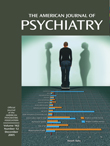To the Editor: We were surprised to read the results of the article by Marc A. Schuckit, M.D., et al.
(1). The authors concluded that all four DSM-IV alcohol abuse criteria perform equally well and that their results favored the threshold of one criterion for the diagnosis of alcohol abuse. This is remarkable because the validity of the abuse category has been one of the main controversies of the DSM-IV classification for alcohol use disorders (e.g., reference
2). We have serious reservations regarding the validity of the data of Dr. Schuckit et al. and their subsequent justification of the one-criterion threshold for alcohol abuse.
First, the study group in the article by Dr. Schuckit et al. was rather unusual, with more than 70% of the subjects being relatives of treatment-seeking alcoholics. This limited the generalizability of their findings. For example, in our recent study of a large general population sample (N=7,076)
(3), subjects with a DSM-IV diagnosis of alcohol abuse could not be differentiated from subjects without a DSM-IV alcohol use disorder diagnosis with a broad range of external validators (e.g., psychiatric comorbidity, functional status, familial alcohol problems, treatment seeking). Subjects with two or more criteria, however, were significantly different from subjects without a DSM-IV alcohol use disorder, indicating better validity for a threshold of at least two criteria
(3).
Second, most of the validators for the DSM-IV diagnosis of alcohol abuse in the article by Dr. Schuckit et al. are rather weak. The fact that subjects with abuse had a higher intake of alcohol than the subjects without an alcohol use disorder is hardly surprising and almost tautological. When the authors looked at drug-related history to compare subjects with one-criterion abuse to subjects without an alcohol use disorder, they did mention drug use (significant difference for cocaine use only) but failed to mention the more relevant prior history of drug abuse or dependence.
Third, when evaluating the 5-year outcome, the authors seemed to ignore the fact that over 70% of the subjects with a DSM-IV diagnosis of abuse at baseline did not endorse any abuse criterion at follow-up. In our general population study, even higher rates of spontaneous remission of DSM-IV alcohol abuse were observed: 81% and 85% at the 1- and 3-year follow-ups, respectively (unpublished report). In a prospective evaluation of the validity of current DSM-IV abuse criteria, these findings should at least be discussed.
In summary, we feel that the limitations of the study by Dr. Schuckit et al. call for a more cautious interpretation and that their findings cannot simply be used as support for the validity of the one-criterion threshold for the diagnosis of alcohol abuse.

